
The open source hardware movement has long advocated for the importance of the right to repair, fully owning the technology purchased, and being able to recombine and replicate parts like music. Therefore, during this challenging time, open source hardware provides some answers to issues raised by the coronavirus pandemic.
Background Overview
First, hardware developers worldwide are working to use open source solutions to address vulnerabilities in the supply chain, a concept that has driven a surge in new software technologies over the past 30 years. Past successes in the hardware movement, such as the RepRap Project, Open Source Ecology, and Open Source Beehives, prove that this is achievable.
There is a growing interest among makers in on-demand production of safety equipment and replacement parts using 3D printing and other technologies. For instance, a laboratory at the Hong Kong Polytechnic University provides 3D-printed masks for hospital staff. An Italian startup, Isinnova, collaborated with Milan’s FabLab to provide 3D-printed replacement valves for ventilators in hard-hit northern Italy. Companies have also released designs to accommodate our physical contact needs, such as Materialise’s 3D-printed hands-free door opener. These examples of replacement parts and solutions are a great starting point for efforts to save lives.
Another traditional hardware technology is rapidly evolving: sewing. According to AFP, there is a global urgent need for masks, and guidance from the World Health Organization emphasizes their importance. As disposable masks are prioritized for healthcare workers, people in the Czech Republic began sewing their own masks. A Facebook group, “Czech Sewing Masks,” started addressing this issue in their country, with thousands of members using their home sewing machines.
Open source hardware devices and mechanical projects are also gaining popularity. First, there are some experimental devices with high precision and powerful capabilities. Second, in the absence of other options, some medical devices (at most) can be classified as field-grade. These projects will be detailed below.
To learn more, I spoke with Jason Huggins, founder and CEO of Tapster Robotics, based in Chicago. Tapster Robotics designs and manufactures desktop robots using 3D printing, CNC machining, and open-source electronics like Arduino. He possesses technical knowledge and industrial capability, making him highly influential. He wants to commit his company’s resources to help in this fight.
“Basically, we are now in a mobilization moment similar to World War II. Even if I’m not a doctor, we should still follow the Hippocratic Oath. Whatever I do, I don’t want to make the problem worse,” Huggins explains, noting: “As a countermeasure, WHO Executive Director Dr. Michael Ryan made a comment: ‘Speed is better than perfection.'”
Wow!
This person is a global authority on disease transmission. If you are a leader (in any capacity), pay attention. If not, still pay attention.
pic.twitter.com/bFogaekehM
— Jim RichardsSh🎙wgram (@JIMrichards1010) March 15, 2020
Huggins has extensive experience in on-demand provision. His efforts helped Healthcare.gov expand after its challenging initial launch. He also created the software industry standard testing frameworks Selenium and Appium. Given this experience, his advice is very valuable.
I also spoke with Mark Tyson, a Seattle attorney at Tyson Law, who collaborates with startups and small businesses. He has direct experience working with agile companies in fast-growing industries. While outlining the overall issue, Tyson stated:
The Good Samaritan Law protects volunteers (i.e., “good Samaritans”) from liability for their decisions to provide assistance in emergencies. Although the specifics of these laws vary by state, they share a common public policy rationale: to encourage bystanders to help others in emergencies. It can be imagined that, beyond the traditional act of pulling a car accident victim from harm, this rationale could justify applying such laws in less traditional settings.
Regarding this specific situation, Tyson pointed out:
“Before taking action, it would be wise for makers to consult with an attorney to assess risks specific to their state. They should also cautiously ask large institutions (like hospitals or insurance companies) to accept potential liability risks through contracts, such as using indemnity agreements, so that hospitals or their insurers agree to indemnify makers’ liabilities.”
Tyson understands the urgency and seriousness of the situation. This option of using contracts does not mean a barrier. On the contrary, it could be a way to facilitate its large-scale adoption to bring about greater change faster. It depends on you or your institution.
In summary, let’s explore projects that are currently in use or development (which may soon be deployable).
7 Open Source Hardware Projects to Combat COVID-19
Opentrons
The open-source laboratory automation platform from Opentrons consists of a set of open-source hardware, validated lab instruments, consumables, reagents, and workstations. Opentrons states that its system can “automatically conduct up to 2400 tests daily within days of placing an order,” significantly helping to scale COVID-19 testing. It plans to ramp up to up to 1 million test samples by July 1.
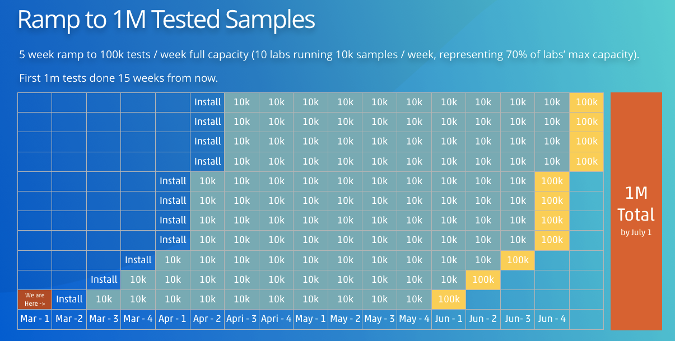
From the Opentrons website, all rights reserved
The company is already working with federal and local government agencies to determine whether its system can be used for clinical diagnostics under emergency use authorization. Opentrons shares under the Apache 2.0 license. I first learned about it from biologist Kristin Ellis, who is connected to the project.
Chai’s Open qPCR
Chai’s Open qPCR device uses polymerase chain reaction (PCR) to quickly test swabs from surfaces (e.g., doorknobs and elevator buttons) for the presence of the novel coronavirus. This open-source hardware, shared under the Apache 2.0 license, uses a BeagleBone low-power Linux computer. The data provided by Chai’s Open qPCR can enable public health, civic, and business leaders to make more informed decisions about cleaning, mitigation, facility closures, contact tracing, and testing.
OpenPCR
OpenPCR is a PCR testing device kit created by Josh Perfetto and Jessie Ho, the creators of Chai Open qPCR. Compared to their previous project, this is more of a DIY open-source device, but it has the same use case: using environmental testing to identify wild coronaviruses. As the project page notes, “Traditional real-time PCR devices capable of detecting these pathogens typically cost over $30,000 and are not suitable for field use.” Since OpenPCR is a user-built toolkit and shared under the GPLv3.0 license, the device aims to democratize access to molecular diagnostics.
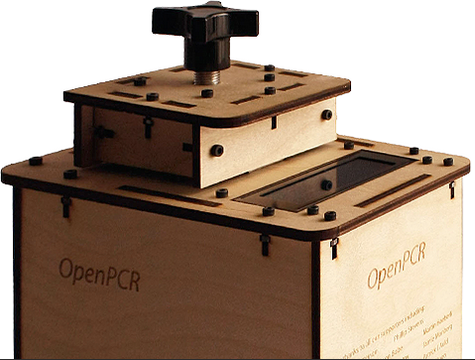
From the OpenPCR website, all rights reserved
And like any good open-source project, it also has a derivative! WildOpenPCR, launched by Gaudi Labs in Switzerland, is also shared under the GPLv3.0 license.
PocketPCR
Gaudi Labs’ PocketPCR thermal cycler activates biological reactions by raising and lowering the temperature of liquids in small test tubes. It can be powered by a simple USB power adapter that can be attached to the device or used separately, with preset parameters when not using a computer or smartphone.
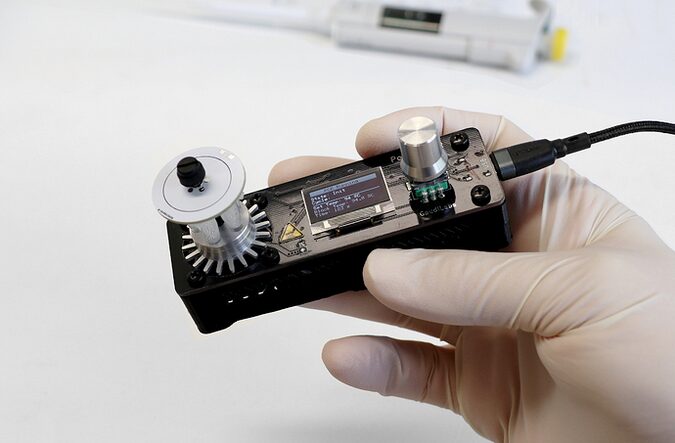
From the PocketPCR website, all rights reserved
Like the other PCR products described in this article, this device may help with environmental testing for the coronavirus, although its project page does not explicitly state this. PocketPCR is shared under the GPLv3.0 license.
Open Lung Low Resource Ventilator
The Open Lung low resource ventilator is a rapidly deployable ventilator that uses a bag valve mask (BVM), also known as an Ambu bag, as its core component. The Ambu bag is mass-produced, certified, compact, mechanically simple, and suitable for invasive conduits and masks. The Open Lung ventilator uses microelectronics to sense and control pressure and flow, enabling semi-autonomous operation.
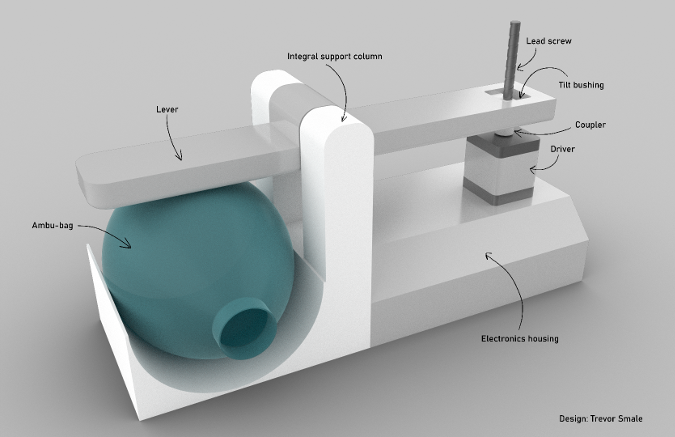
Open Lung, GitLab
This early project has a large team of hundreds of contributors, with leaders including: Colin Keogh, David Pollard, Connall Laverty, and Gui Calavanti. It is shared under the GPLv3.0 license.
Pandemic Ventilator
The Pandemic Ventilator is a prototype of a DIY ventilator. Like the RepRap project, it uses commonly available hardware components in its design. The project was uploaded over a decade ago by user Panvent on Instructables and has six main production steps. The project is shared under the CC BY-NC-SA license.
Folding at Home
Folding at Home is a distributed computing project for simulating protein dynamics, including the process of protein folding and the movement of proteins associated with various diseases. This is a call to action for citizen scientists, researchers, and volunteers, similar to the retired SETI@Home project using home computers to run decoding calculations. If you are a technician with powerful computer hardware capabilities, this project is for you.
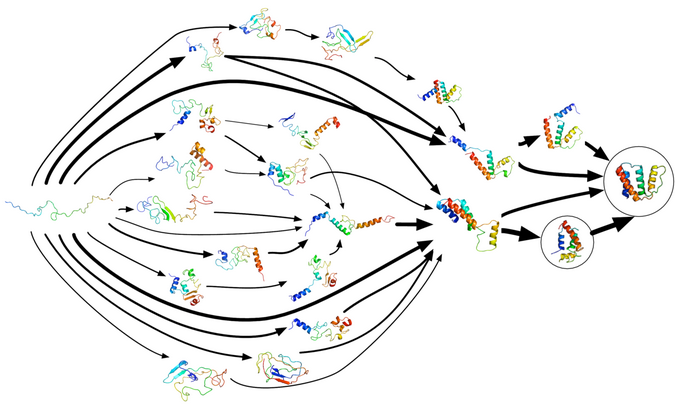
Vincent Voelz, CC BY-SA 3.0
The Folding at Home project uses Markov state models (as shown above) to model the shapes and folding pathways proteins might take to find new therapeutic opportunities. You can find more information about the project in the post by biophysicist Greg Bowman from Washington University, “How It Works and How to Help.”
The project involves academic labs, contributors, and corporate sponsors from many countries and regions (including Hong Kong, Croatia, Sweden, and the United States). It is shared on GitHub under a mix of GPL and proprietary licenses and can run on Windows, macOS, and GNU/Linux (like Debian, Ubuntu, Mint, RHEL, CentOS, Fedora).
Many Other Interesting Projects
These projects are just a small part of the open-source hardware field addressing or treating COVID-19 activities. While researching this article, I discovered other projects worth exploring, such as:
These projects span the globe, and this global collaboration is precisely what we need because the virus knows no borders. The COVID-19 pandemic has affected countries in different ways at different times, so we need a distributed approach.
As my colleague Steven Abadie and I wrote in the OSHdata 2020 report, the open-source hardware movement is a global movement. Individuals and organizations participating in this certification project span 35 countries and every hemisphere.
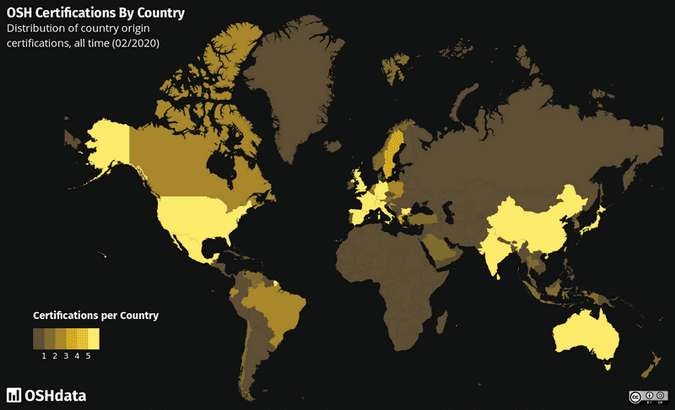
OSHdata, CC BY-SA 4.0 International
If you’re interested in joining the conversation with global open-source hardware developers, please join the open-source hardware summit’s Discord server and engage in discussions about COVID-19 through dedicated channels. Here you can find robotics experts, designers, artists, firmware and mechanical engineers, students, researchers, and others who are all working together in this fight. Hope to see you there.
via: https://opensource.com/article/20/3/open-hardware-covid19
Author: Harris Kenny Topic: lujun9972 Translator: wxy Proofreader: wxy
This article is originally compiled by LCTT and proudly presented by Linux China